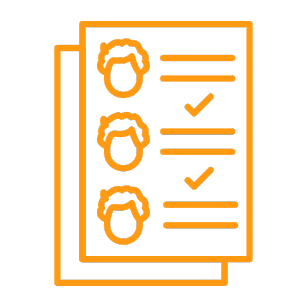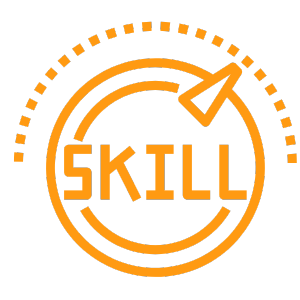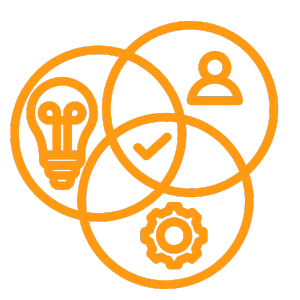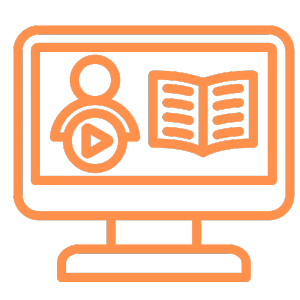Guidelines

Beneficiary Satisfaction Measurement
Introduction
At Taibah Higher Training Institutes Company, we put the satisfaction of beneficiaries at the top of our priorities, and we are constantly working to improve our educational and training services. The beneficiary satisfaction measurement system is designed as an effective tool to understand the needs of our students, faculty and partners, and to ensure that we deliver an outstanding experience that meets their expectations.
Objectives of measuring beneficiary satisfaction
- Evaluate the quality of educational and training services provided.
- Identify strengths and weaknesses to improve performance.
- Enhance the experience of beneficiaries by meeting their needs and requirements.
- Build a long-term relationship with beneficiaries based on trust and transparency.
Satisfaction measurement axes
1. Quality of educational services
- Evaluate the curricula and their compatibility with the requirements of the labor market.
- Measuring the efficiency of trainers and faculty members.
- Analyze the effectiveness of training programs and the extent to which they achieve educational objectives.
2. Beneficiary experience within the Institute
- Measure the level of comfort and satisfaction with facilities and infrastructure.
- Assess ease of access to resources and administrative support.
- Identify the level of student satisfaction with the learning environment.
3. Support and counseling services
- Student satisfaction with academic and career advising services.
- The effectiveness of communication channels between the administration and students.
- The quality of technical support and technical services provided.
Measurement Tools and Mechanisms
- Electronic questionnaires: Periodic questionnaires are distributed to students and staff to measure their satisfaction with various aspects.
- Interviews and group discussions: Organize dialogue sessions with beneficiaries to get their direct feedback.
- Analysis of complaints and suggestions: Review and analyze the observations received through the channels of complaints and suggestions.
- Performance indicators: Track key performance indicators such as attendance and success rates, and student enrollment levels.
Reporting & Analysis
- Data is collected and analyzed periodically to prepare comprehensive reports that present results and observations.
- These reports are submitted to senior management with the aim of making data-driven decisions to improve performance.
Procedures to improve beneficiary satisfaction
- Review satisfaction measurement results and identify areas that need improvement.
- Develop clear action plans to address weaknesses.
- Implement the required changes and follow up their impact on the beneficiaries.
- Strengthen communication channels with beneficiaries to clarify efforts to improve our services.
Participation in the measurement process
- For beneficiaries: We encourage all our students and faculty to participate in satisfaction surveys and provide feedback to improve services.
- For the Institute: We are committed to treating all data with strict confidentiality and ensuring that it is used only for performance improvement purposes.
Feedback can be submitted via
- Email: [email protected]
- User Service Desks: Suggestion boxes are available at the various facilities of the Institute.
We always strive to achieve the highest levels of satisfaction, and we are constantly developing our services to meet the expectations of our beneficiaries. Your opinion is our inspiration for evolution and excellence.

Train-the-Trainers Plan on Three Axes
Introduction
At Taibah Higher Training Institutes Company, we realize the importance of qualifying trainers comprehensively to ensure that the highest quality is provided in the training and educational process. The three-axis training of trainers plan aims to enhance their skills in key areas that support professional and educational competence.
Objectives of the Plan
- Developing the skills of trainers in specialized, educational and technical fields.
- Enable trainers to use effective education and training strategies.
- Enhance the ability to communicate and interact with trainees effectively.
- Improving the quality of training provided in line with international standards.
The Three Pillars of Training
1. Specialized Axis
Objective: To enhance deep knowledge of the specialized materials offered by the trainer.
Training Content:
- Advanced study in the field of specialization.
- Practical applications in related topics.
- Review the latest research and practices in the field.
Training duration: 20 hours.
2. Educational Axis
Objective: To improve teaching skills and effective communication with trainees.
Training Content:
- Interactive teaching strategies.
- How to deal with the diversity of learning styles among trainees.
- Evaluate academic performance and motivate trainees.
Training duration: 15 hours.
3. Technical Hub
Objective: To enable trainers to use modern technologies in training.
Training Content:
- Use technology tools in training (e.g. e-learning systems).
- Interactive digital content design.
- Manage virtual classrooms and educational platforms.
Training duration: 10 hours.
Implementation mechanisms
- Training is carried out in the form of physical and virtual workshops.
- Training includes practical activities, case studies, and group discussions.
- Electronic resources are provided to support continuous learning after the end of the program.
Evaluation Mechanism
- Instructors are evaluated by:
- Theoretical and practical tests for each axis.
- Trainers’ observations during training sessions.
- Questionnaires to measure trainers’ satisfaction with the program.
- The trainer is awarded a certificate of passing upon fulfilment of all training requirements.
Benefits of the plan for trainers
- Improve professional competence and enhance career development opportunities.
- Acquire advanced skills in the use of technology in training.
- Raising the level of self-confidence and positive interaction with trainees.
- Excellence in providing training programs in line with quality standards.
Registration & Participation
- Registration: Interested trainers can register through the online registration form.
- Dates: The dates of the courses are announced periodically through the Institute’s communication channels.
Communication & Inquiries
If you have any questions about the Training of Trainers plan, please contact us via:
- Email: [email protected]

Trainee Skills & Competencies
To ensure a distinguished training experience in the e-learning environment, the trainee must possess the following skills and knowledge:
- Basic technical skills:
- Fluent in computer operation and its accessories.
- Ability to deal with computer operating systems.
- Fluent in using Microsoft Office programs.
- Ability to manage and organize electronic files.
- Dealing with the Internet and electronic networks:
- Proficient in the use of the Internet in searching for and accessing information.
- Dealing with electronic networks effectively.
- The ability to download books and programs from the Internet.
- Electronic Communication Skills:
- Fluent in dealing with e-mail.
- Ability to participate and interact in online educational forums.
- Fluent in dealing with electronic chat programs such as Zoom or Teams.
- Multimedia use:
- He is fluent in using the multimedia provided to him in e-training.
- The ability to deal with interactive systems provided within the training content.
- Readiness for self-learning:
- Demonstrates the ability to follow up on online activities and assignments according to the specified schedules.
- Commitment to active participation in virtual classes and training activities.

Trainer Knowledge, Skills & Competencies Guide
Introduction
The role of the trainer at the Taibia Institute is pivotal in the success of the training programs and the achievement of the desired educational goals. To ensure the delivery of outstanding and effective e-training, trainers must have a full set of knowledge, skills, and competencies that enable them to deal with various aspects of e-training. This guide aims to identify the basic requirements that trainers must have to ensure the quality of the educational and training process.
Knowledge required
- Computer operation and accessories
- Proficiency in the use of computers and understanding its basic components.
- Computer Operating Systems
- Ability to handle various operating systems such as Windows, macOS, and Linux.
- Microsoft Office Programs
- Proficiency in using Microsoft Office programs such as Word, Excel, PowerPoint, and Outlook.
- Electronic Networks
- Understand the basics of electronic networks and the ability to manage network connectivity.
- Email address
- Ability to manage email effectively and use it as an essential communication tool.
- Electronic File Management
- Organize and store electronic files in an orderly and secure manner.
- Private web site
- It is preferable for the trainer to have his own website to enhance his digital presence.
- Using the Internet for Search
- The ability to search for and access information using various search tools and techniques.
- E-Libraries
- Dealing with electronic libraries associated with educational or independent institutions.
- Download books and programs from the Internet
- Know how to download and use educational resources from the Internet safely and effectively.
- Register and participate in educational forums
- Ability to engage in educational forums and contribute to discussions.
- Design and publication of web pages
- Proficiency in designing and publishing web pages using various web design tools.
- Electronic Chat Software
- Ability to use online chat programs such as Zoom, Microsoft Teams, and Skype effectively.
- E-training activities related to the field of training
- Use interactive activities and online exercises to enhance the learning experience.
- Electronic communication with trainees
- The ability to communicate effectively with trainees through various electronic means.
- The diversity of multimedia used in e-training
- Use a variety of multimedia such as videos, presentations, and podcasts to enhance the learning process.
Required Skills
- Effective planning and design of distance education
- Ability to design effective training plans using technical means.
- Use of electronic calendar methods
- Apply various evaluation methods to evaluate the performance of trainees electronically.
- Developing professional performance using technical means
- Utilize technologies to improve and develop continuous professional performance.
- Use mobile devices for flexibility and interaction
- The ability to use smartphones and mobile devices to enhance interaction in the educational process.
- Dealing with scientific material, attendance techniques and tests
- Manage educational content and interact with attendance systems and electronic exams efficiently.
- Safe use of technology resources
- Ensure the safe and responsible use of educational technologies and tools.
Required competencies
- Mastering basic computer skills
- The ability to use the computer efficiently and effectively.
- Using social media platforms in academic environments
- Leverage social media platforms to enhance learning and academic interaction.
- Develop a full description of the training program
- Prepare a comprehensive and detailed description of the training programs to ensure clarity of objectives and content.
- E-learning content design
- Create and develop e-learning content that suits the needs of trainees.
- Diversify teaching methods and encourage teamwork
- Use various teaching methods to enhance interaction and teamwork among trainees.
- Update e-learning content
- Review and update educational content regularly to keep pace with recent developments and innovations.
- Follow-up of the electronic attendance of trainees
- Monitor the attendance of trainees and ensure their commitment to the specified dates.
- Ensure continuous interaction between trainers and trainees
- Enhance communication and continuous interaction to ensure the effectiveness of the educational process.
- Monitoring trainee progress and continuous evaluation
- Follow up on trainee progress and provide fair and sustainable assessments to improve the learning experience.
The end
The availability of the above knowledge, skills, and competencies is the basis for the success of trainers in providing outstanding and effective e-training. Taibia Institute is committed to supporting and developing its trainers to ensure the highest levels of quality in the educational and training process.

Trainee Skills & Competencies
1. In simultaneous cycles:
- Direct communication with trainees during the course is carried out through:
- Text chat in virtual classrooms.
- Direct talk with the coach.
- Specific times are allocated for inquiries and discussion during training sessions.
2. In synchronous and asynchronous cycles:
- Special forums are created on the Institute’s website, or applications such as WhatsApp or Telegram are used to communicate with trainees and answer their inquiries by:
- Coach.
- Technical support team.
3. In asynchronous cycles:
- The technical support team responds to trainees’ inquiries through the following channels:
- Email.
- Mobile messages.
- Comments within the course.
- Chat platform on the website.
Official Communication Channels:
- Email: [email protected]
- Chat on the website: Website link
- WhatsApp: 0551843881
- Customer Service Number:0551843881
Escalation Policy:
- If queries are not answered within 24 hours, you can contact the Director of the Institute directly: 055XXXXXXXX.
Rules and procedures when communicating during training courses:
- Respect your fellow trainees:
- Give your colleagues the opportunity to inquire and discuss before asking your queries.
- Avoid interrupting the trainer during explanation:
- The trainer sets a dedicated time for inquiries and discussions.
- Camera and mic closure:
- The camera or mic is allowed only after permission from the trainer.
- Do not delve into inappropriate topics:
- Adhere to the topic of the course and avoid political, religious or personal discussions.
- Electronic Etiquette:
- Commit to using respectful language, and avoid sending spam.
General guidelines for effective communication:
- Organize ideas: The ideas put forward should be clear and tidy.
- The participation is free from linguistic errors.
- Tactfulness: Use polite words and respectful language.
Taibia Institute is committed to providing a distinctive learning experience and ensuring an effective response to trainees’ inquiries to ensure the maximum benefit from e-training.

